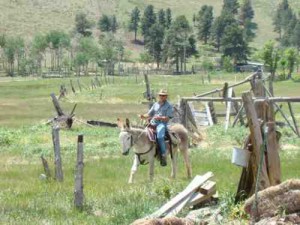Review by Lynda La Rocca
Books – January 2009 – Colorado Central Magazine
I HAVE TO ADMIT that I had a little trouble selecting some “favorites” for this column because, frankly, I didn’t read a lot of books in 2008 that were “new” to me in the sense of never having read them before. Instead, I had concentrated on rereading old favorites, many of which I’ve recommended previously in the pages of Colorado Central.
Given the ongoing economic turmoil and the pervasive pall of gloom and anxiety that colored this most recent election year — Barack Obama’s victory being one of the few bright spots — I’ve been in need of a major dose of comfort. Rereading beloved books comforts me and so, before turning to two “new” books on my list, I’ve decided to revisit a very old friend, the Laura Ingalls Wilder classic Little House in the Big Woods.
When I was a child, I wanted to be little Laura, one of Ma and Pa’s beloved daughters and the author of nine “Little House” books chronicling her family’s pioneer life in places like South Dakota, Minnesota, Kansas, and Wisconsin, the latter the setting for Little House in the Big Woods.
I was (and remain) enchanted by Wilder’s descriptions of Pa and Grandpa tapping trees for sap to make maple syrup and maple sugar. I pictured Pa playing his fiddle at the dance after the “sugaring off,” where Ma wore the beautiful, dark-green dress with the tiny, strawberry-like patterns that made her look “so rich and fine that Laura was afraid to touch her.” I laughed at Grandma emerging from the kitchen where she had been stirring the bubbling syrup to kick up her heels with young Uncle George, who she exhausted with her spirited dancing.
I even tried making my own candy by sneaking a bottle of syrup out of the fridge and pouring it onto fresh snow in our back yard. Unfortunately, since I wasn’t allowed to use the stove back then, I couldn’t heat the syrup and so it didn’t cool and congeal into the soft maple-sugar candy that was such a special treat for Laura and her siblings and cousins.
“They could eat all they wanted, for maple sugar never hurt anybody,” Wilder wrote, a declaration that echoes my own politically and nutritionally incorrect motto, “Sugar is your friend.”
But most of all, I loved the chapter about Christmas, where the children are thrilled and grateful to find their stockings filled with nothing more than a pair of red mittens and a single stick of peppermint candy, and Laura receives her most cherished gift, a rag doll she named Charlotte. I wanted to live in that simple way, where each day was filled with hard work and wonder, every material item was valued (and repaired and used as long as possible), and everyone was wrapped so snugly in love that no winter wind could penetrate their hearts.
Former U.S. poet laureate Billy Collins might readily identify with such a yearning. In Sailing Alone Around the Room, a kind of “Greatest Hits” compilation from four previous collections along with a handful of new poems, Collins writes about the pleasures of splitting ash logs into firewood:
“. . . the feet planted wide,
the silent unstoppable flow of the downswing,
the coordination that is called hand-eye, . . .
I want to say there is nothing
like the sudden opening of wood, . . .
the stroke of the ax like lightning,
the bisection so perfect . . .”
I’m ashamed to admit that until recently, I had been almost completely unfamiliar with Collins’s work. Now I can’t get enough of him and his penchant for delighting and surprising readers with poetry that is at once slyly humorous and deeply moving, that juxtaposes the most minute, even mundane, details of daily life with transcendence.
Collins writes with wisdom and grace about loving and being loved, memories and changing seasons, music and loss, food and family. He introduces characters like the woodsman who squanders three magic wishes by asking for a skillet of hot sausages, prompting his infuriated wife to wish the skillet pasted to the woodsman’s nose, thereby necessitating the use of the final wish to remove the pan from the man’s face. Then there’s the overly sensitive history teacher who:
“Trying to protect his students’ innocence
he told them the Ice Age was really just
the Chilly Age, . . .
The Spanish Inquisition was nothing more
than an outbreak of questions such as
“How far is it from here to Madrid?”
Even the titles of Collins’s poems are devilishly delicious, from “Taking Off Emily Dickinson’s Clothes” (“The complexity of women’s undergarments/in nineteenth-century America/is not to be waved off,/and I proceeded like a polar explorer/through clips, clasps, and moorings . . .” ) to “Another Reason Why I Don’t Keep a Gun in the House” (“The neighbors’dog will not stop barking” ).
Equal doses of a similar irreverence, coupled with understanding, humor, stunning sensitivity, and brutal honesty, permeate the pages of Anne Lamott’s Plan B: Further Thoughts on Faith. Like Collins, Lamott is a deft portrayer of both the big picture and the tiniest, most telling detail. In this series of essays, the novelist and nonfiction author of such bestsellers as Bird by Bird: Some Instructions on Writing and Life covers everything from friendship, parenthood, pets, addiction, spirituality, and dying, to war, politics, and her ongoing attempts to stop despising George W. Bush.
Lamott’s first-person accounts can be laugh-out- loud funny, as when she wins an unwanted ham while food-shopping on her 49th birthday. “If God was giving me a ham, I’d be crazy not to receive it. Maybe it was the ham of God, who takes away the sins of the world,” she muses before running into a down-on-her-luck friend who is touchingly grateful when Lamott gives her the porcine prize.
An unabashed (but never self-righteous) Christian who is constantly turning to, and talking to, God, Lamott has a quirky, endearing relationship with the deity. Witness this recounting of her minister explaining that “. . . if the president had been the only person on earth, Jesus would still have loved him so much that he would have come down and died for him.”
“This,” Lamott continues, “drives me crazy, that God seems to have no taste, and no standards.”
In terms of comforting me and raising my spirits, Plan B worked as well as any of my trusted, old-favorite books. In fact, it has now officially become a trusted favorite that I will read again — and again. ¤


